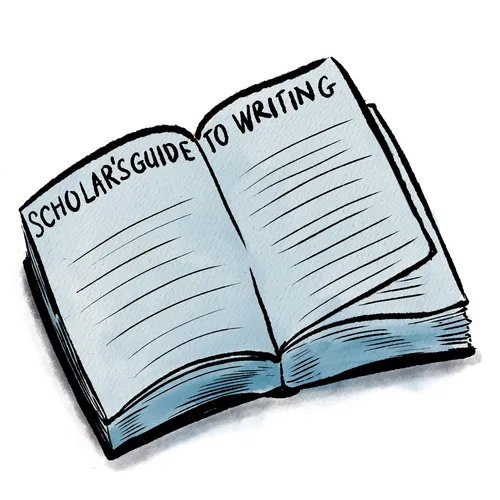
The Scholar’s Guide to Writing
The FTE Scholar’s Guide to Writing is a series of guided practices to assist scholars in the art of writing.
- Update frequency
- every day
- Average duration
- 19 minutes
- Episodes
- 16
- Years Active
- 2022 - 2023

Chapter 11: Dealing with Distraction
We know it's a struggle to carve out time to write, especially with all things in our environment that compete for our attention. Let's talk about some key strategies to help you feel less distracted…

Chapter 16: Personal Archive
What's in your personal archive? What body of work do you want to leave for yourself and the public? Join us for some prompts to help you imagine the arc of your scholarly career.
If you have themes…

Chapter 15: Publishing Proposal
How do you write a great book proposal to a potential publisher? Let us demystify the process of crafting a proposal and building a relationship with a publisher to get your writing into the world.
I…

Chapter 13: Scholarly Voice
What kind of scholar are you? What is your area of expertise? How does your audience understand who you are and what you write? Let's get into some prompts that help you tease out your unique voice a…

Chapter 12: Zero Draft
This is the draft before the first draft. Get ready for some prompts to help you get some words down on the paper that you can work with.
If you have themes you'd like us to explore, write us at doct…

Chapter 14: Audience
Who is your audience? Who do you imagine holding your book, reading your words? We'll share some prompts to help you think about the intent of your writing and how you reach the people your writing i…

Chapter 9: Writing for Me
How do you write for you first, before anyone else? What is your writing style? What is your writing habit? Why do you write? Let's get some words down on paper to explore who you are as a writer.
I…

Chapter 10: Writing is Liberation
Telling your own story is powerful but we're exploring writing as liberation for our people. Liberation is the work of your ancestors. The prompts in this episode will get you writing about your drea…

Chapter 3: Methodology
The Methodology chapter is where you’ll explore your method and study the philosophy of research. It is the why behind your how! You’ll practice examining your own methodology to allow you to easily …

Chapter 8: Editing
The Editing chapter is a humorous take on the dreaded task of editing. It is about the art of finding a good editor and being willing to receive and use their critical feedback as well as knowing wh…

Chapter 4: Findings
The Findings chapter is designed to help you get your discoveries down on paper without the intensely high bar that we set for ourselves. You’ll practice embracing bullet points and sometimes just ge…

Chapter 5: Analysis & Next Steps
This Analysis and Next Steps chapter is where you tell the reader and the committee why the things that you found, the things you just explained to us, matter to the world. The practice will help ana…

Chapter 2: Literature Review
The Literature Review chapter will help you create an inventory of all those sources that have laid a foundation for your dissertation and support your argument. This practice will help you to think …

Chapter 1: Writing the Acknowledgements First
The Writing the Acknowledgements First chapter is the easiest part of writing a dissertation and yet it's the hardest part. To sustain you and to cultivate your writing you can return to the acknowle…

Chapter 7: Write the Introduction Last
The Writing the Introduction Last chapter is exactly as unorthodox as the title suggests. It is waiting till the end to write the beginning. The practice of writing an introduction of one’s self can …

Chapter 6: Conclusion
The Conclusion chapter is about writing an ending, any ending. We will explore how to wrap up the dissertation and get you to tell the ending of your dissertation story. You are a writer! So write an…